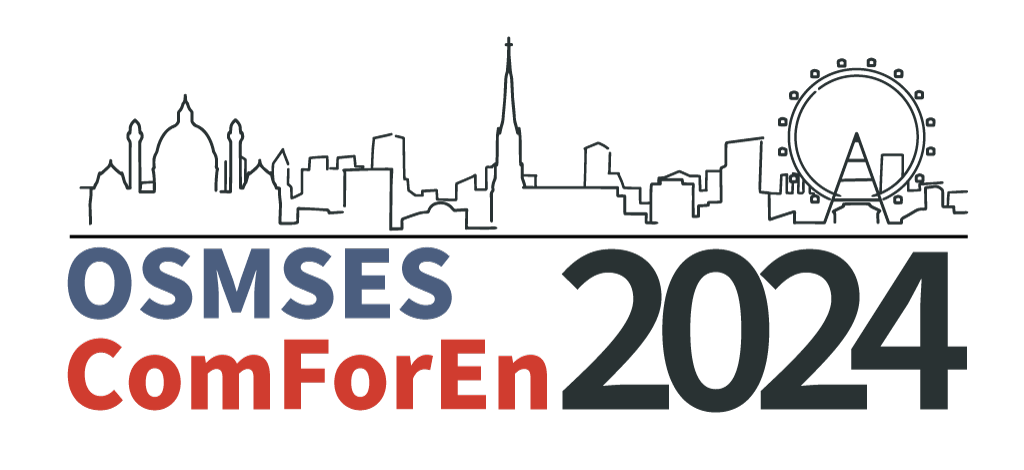Overview
The following tables provide a brief overview of the conference programs for Open Source Modelling and Simulation of Energy Systems (OSMSES) 2024 and Symposium Communications for Energy Systems (ComForEn) 2024, the details are shown below.
| Day 1 - September 3, 2024 - 08:30 - 22:00 | Day 2 - September 4, 2024 - 08:30 - 18:30 |
| Registration and get-together | Registration and get-together |
| OSMSES 2024 Opening and Keynote Session | Panel Session |
| Paper Sessions 1-3 | Paper Sessions 4-5 |
| Tutorial Sessions 1 | Tutorial Sessions 2-3 |
| City Tour (18:00-19:30) - Tour ends at Conference Dinner Venue | Closing Session |
| Conference Dinner (from 19:30) - Entry to “Wiener Ratshauskeller” | End of OSMSES 2024 |
| Day 3 - September 5, 2024 - 09:00 - 20:00 | Day 4 - September 6, 2024 - 09:00 - 15:00 |
| Registration and get-together | Registration and get-together |
| ComForEn 2024 Opening and Keynote Session | Presentation Sessions 3-4 |
| Presentation Sessions 1-2 | Wrap-up Day 3 |
| Tram Session and Project Roundtrip | Closing Session |
| Networking Dinner (from 18:00) at Conference Venue | End of ComForEn 2024 |
Details
The conference program shows the times in Central European Summer Time (CEST = UTC + 2h), therefore, mind your local time!
We recommend using one of time zone conversion tools like https://www.worldtimebuddy.com to convert the conference time (in CEST) to your local time.
| Day 1 - September 3, 2024 - 08:30 - 22:00 | |
| 08:30 - 09:00 | Registration and get-together |
| 09:00 - 09:10 | Welcome and Opening |
09:10 - 10:10
| Keynote (Session Chair: Mark Stefan)
|
| 10:10 - 10:30 | Coffee Break |
10:30 - 12:15
| Paper Session 1 “Modelling and (Co-)Simulation of Energy Systems” (Session Chair: Thiemo Pesch)
|
| 12:15 - 13:15 | Lunch Break |
13:15 - 15:00
| Paper Session 2 “Modelling and Simulation of Multi-Physics/Energy Systems” (Session Chair: Mark Stefan)
|
| 15:00 - 15:20 | Coffee Break |
15:20 - 16:50
| Tutorial 1 (Session Chair: Trevor Hardy)
|
16:50 - 18:00
| Paper Session 3 “Computational Approaches and Methods for Energy Systems” (Session Chair: Filip Pröstl Andrén)
|
| 18:00 - 19:30 | City Tour |
| 19:30 - 22:00 | Conference Dinner |
| 22:00 | End of Day 1 |
| Day 2 - September 4, 2024 - 08:30 - 18:30 | |
| 08:30 - 09:00 | Registration and get-together |
09:00 - 10:10
| Panel Session “Development, Management and Applications of Open-Source Smart Energy Systems Education” (Session Chair: Alkistis Kontou) ICT technologies and interdisciplinary knowledge are crucial for understanding smart energy systems. A proactive approach from academia, industry, and the community is needed to adapt teaching methods and train the next generation of engineers. Open-source tools and educational materials can enhance learning for those in this sector. This panel session will present innovative educational methods for students, researchers, and professionals, showcasing examples and opportunities for free access to tools and services. A strategy for delivering open-source educational content during research projects will also be presented, fostering continuous learning and bridging the gap between academia and industry.
|
| 10:10 - 10:30 | Coffee Break |
10:30 - 12:15
| Paper Session 4 “Real-time Simulation and Hardware-in-the-Loop Applications” (Session Chair: Alkistis Kontou)
|
| 12:15 - 13:15 | Lunch Break |
13:15 - 14:45
| Tutorial 2 (Session Chair: Yifei Lu)
|
| 14:45 - 15:05 | Coffee Break |
15:05 - 16:35
| Tutorial 3 (Session Chair: Gianluca Lipari)
|
16:35 - 18:20
| Paper Session 5 “Energy System Optimization and ICT Applications” (Session Chair: Thiemo Pesch)
|
| 18:20 - 18:30 | Closing |
| 18:30 | End of Day 2 |
| Day 3 - September 5, 2024 - 09:00 - 20:00 | |
| 09:00 - 10:00 | Registration & Get-together with Coffee |
| 10:00 - 11:00 | Friederich Kupzog & Jochen Cremer, Welcome & Opening (Session Chair: Friederich Kupzog) Keynote: Denis Parganlija, “Energy Industry and AI: Selected Use Cases at VERBUND AG” |
11:00 - 12:30
| Session 1 “AI-Driven Control and Decision Support for Modern Power Systems” (Session Chair: Jochen Cremer)
|
| 12:30 - 13:30 | Lunch Break |
13:30 - 15:00
| Presentation Session 2 “Advanced Techniques in Fault Detection and Event Analysis for Power Systems” (Session Chair: Mark Stefan)
|
| 15:00 - 15:30 | Coffee Break |
15:30 - 17:30
| Tram Session
|
| 18:00 - 20:00 | Networking Dinner |
| 20:00 | End of Day 3 |
| Day 4 - September 6, 2024 - 09:00 - 15:00 | |
| 09:00 - 09:30 | Registration & Get-together with coffee |
09:30 - 10:30
| Friederich Kupzog & Jochen Cremer, Wrap-up day 1 & Opening (Session Chair: Friederich Kupzog) Keynote 2
|
10:30 - 12:00
| Presentation Session 3 “Unlocking the Potential of Big Data in the Energy Domain” (Session Chair: Stefan Wilker)
|
| 12:00 - 13:00 | Lunch Break |
13:00 - 14:30
| Presentation Session 4 “Transforming Energy Systems: Cutting-Edge AI and Data-Driven Solutions” (Session Chair: Friederich Kupzog)
|
| 14:30 - 15:00 | Closing |
| 15:00 | End of Day 4 |




